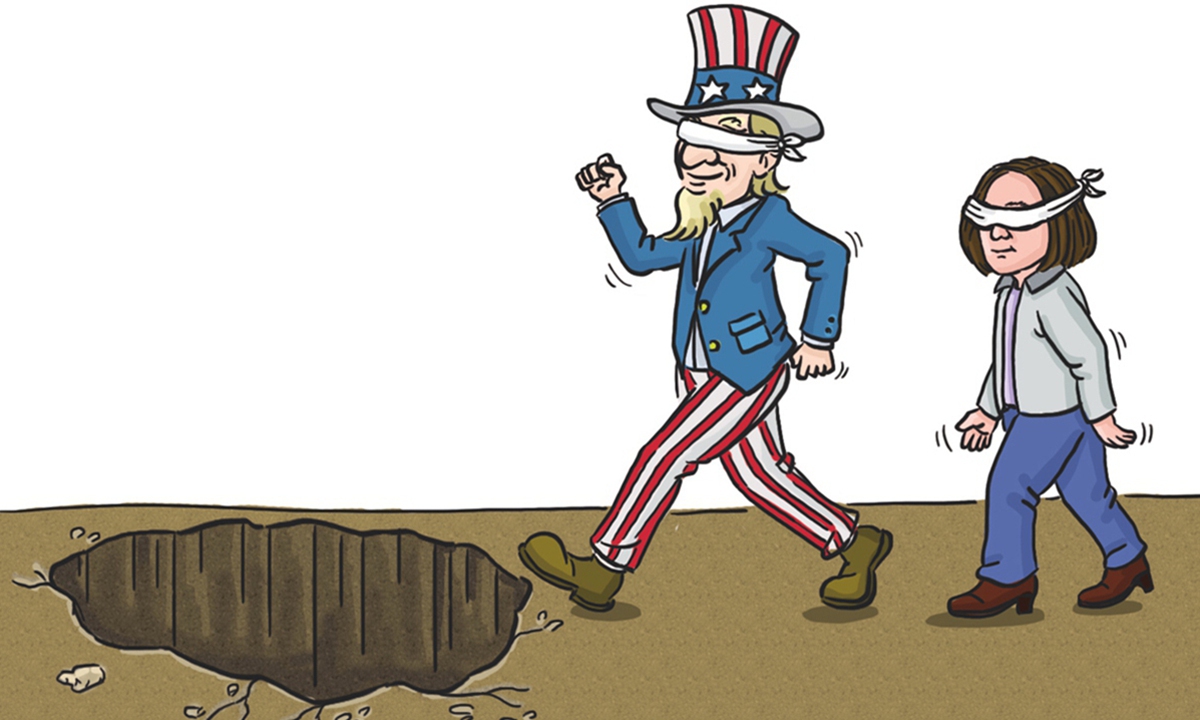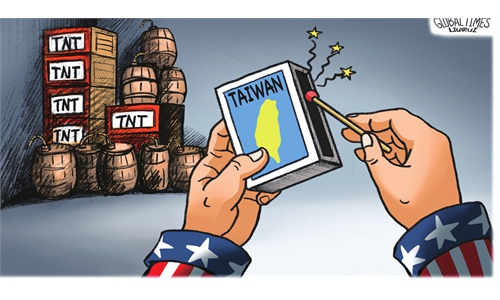
US, Taiwan Illustration: Xia Qing/GT
The former chief of cultural affairs authority in the island of Taiwan and writer Lung Ying-tai published an article in The New York Times on April 19, describing the growing division in the Taiwan island, which she believes has caused harm to Taiwan. At first glance, the title ''In Taiwan, Friends Are Starting to Turn Against Each Other'' doesn't seem to reveal any specific issues. However, upon closer examination of the article, the familiar tone and sentiment emerge.
Lung, who is now in her 70s, cited stories and remarks from several friends or neighbors, expressing "concern" about the fragmentation of the society of the Taiwan island. In reality, these accounts are mostly about portraying the so-called "military threat from the Chinese mainland," while also inadvertently revealing some dubious value convictions. Lung's initial stance is clearly one of opposition to the Chinese mainland. She doesn't show any dissatisfaction with reported US' "scorched earth" strategy or "plan to destroy Taiwan."
Who is responsible for the division within Taiwan? There is no doubt that Lung's interpretation is in line with US' taste. However, it is clear that the internal opposition and division within the Taiwan island is caused by the "Taiwan independence" separatist forces and external powers. Now, some people represented by Lung want to blame everything on the Chinese mainland's policy toward Taiwan.
The US has been escalating the Taiwan question step by step, while the Democratic Progressive Party has been maintaining its power by creating panic to secure votes, which is causing anxiety within Taiwan. There is no doubt that Lung is fueling and selling this anxiety, creating disharmony between the Chinese mainland and Taiwan. This is manipulation and misinformation of public sentiment, not only hijacking the will of the people in Taiwan but also kidnapping the optimistic prospect of peaceful reunification.
Lü Xiang, a research fellow at the Chinese Academy of Social Sciences, noted that from her articles, one can sense she is confused between right and wrong in the current world changes. As the offspring of the Chinese nation, a resident of the Taiwan island, and a celebrity, instead of fighting against the "Taiwan independence" separatist forces, she has created a sad and depressing mood that has a great impact on young people in Taiwan. This will make young people lose their direction and fall into a pessimistic and confused state regarding the future.
"But in fact, if Taiwan compatriots can think clearly, they should respond to influential figures like Ma Ying-jeou, promote peaceful reunification across the Taiwan Straits. As long as the people in Taiwan move forward in the direction of the 1992 Consensus, peaceful reunification will be achieved within a foreseeable period of time, and this is in the best interests of both sides. Unfortunately, I cannot see this rationality from Lung's article, which is very sad," Lü said.
As a writer with a certain influence in Taiwan, Lung has no self-reflection and even wants to highlight her "wisdom and intelligence" on this occasion. She claims strength should be only a part of Taiwan's strategy, and politicians and other public figures even should show true courage by reaching out to China the Chinese mainland to somehow de-escalate. The real purpose of Lung's claims is not to pursue a good atmosphere between the two sides, but to try to confuse and delay peaceful reunification across the Straits.
The group of people, represented by Lung, are extremely contradictory in their hearts. They are afraid of force, but they are unwilling to promote peace. They even position themselves as "outsiders." Perhaps Lung really sees herself as an outsider, because concerns in her eyes are that the so-called division and mistrust on the island have "played right into the hands of the Chinese mainland," rather than the real concerns and worries about the people in Taiwan and the future of Taiwan.
This deliberate rendering of panic can lead to a lack of objective understanding of the external situation among the people in Taiwan, causing them to blindly follow the wrong path and be hijacked by the stubborn "Taiwan independence" separatist forces represented by Tsai Ing-wen. That is what the US is happy to see.
For the US, Taiwan is a chess piece, a consumable. It is not an object that the US truly cherishes, loves and firmly defends. Some people on the island still blindly believe in US' promises. This erroneous judgment leads them to think of themselves as an object that needs protection rather than a chess piece that can be used at any time.
As a public figure, Lung should lead the people in Taiwan to a correct understanding of the situation across the Taiwan Straits. As long as there are people in Taiwan who can distinguish right from wrong, they will not be willing to be a chess piece, but instead hope to guard a peaceful and safe society and achieve a vision of peaceful reunification.

